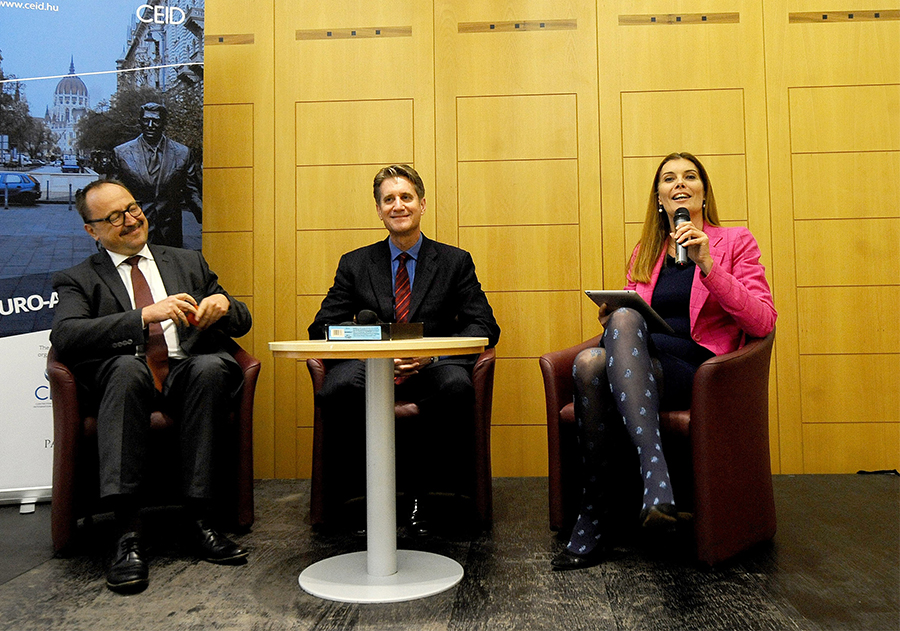
28 Sep Russia and the West: can we re-energize our relationship? – Event summary
Are sanctions worth?
The illegal annexation of Crimea by Russian troops required a European response which was harsher than diplomatic condemnation but softer than military retaliation. Economic and financial sanctions seemed the right solution to create a balance between putting pressure on Moscow while avoiding further escalation of the conflict. However, half-way solutions usually lead to half-way results. According to Mr. Zsolt Németh, Chairman of the Foreign Affairs Committee of the Hungarian Parliament, sanctions against Russia do not seem to work neither as a foreign policy instrument nor as a trade activity. This is proven by Russia’s reluctance to change its foreign policy course towards Europe, which leaves Europe with very limited room for maneuver in seeking compromise with Moscow. In Mr. Németh’s assessment, sanctions rather serve to save the conscience of the international community, which feels obliged to show solidarity with war-torn Ukraine.
On the other hand, Mr. Matthew Bryza, former Deputy Assistant Secretary of State for Europe and Eurasia, underlined that sanctions are essential for US foreign policy. He also pointed at the fact that sanctions targeting specific individuals by cutting off their assets or making them unable to leave their country did have a serious impact, especially in a country where the concentration of power, wealth and influence in the hands of just a few prominent stakeholders is so apparent. As for the US strategy towards Russia, Mr. Bryza lamented that all American presidents had made the mistake of romanticizing the US-Russian relationship and all had claimed to know how Russians should be dealt with. The problem is that the current Russian leadership is competing with the West, taking advantage of each and every opportunity to destabilize and undermine the Western Alliance. Nevertheless, Mr. Bryza warned against letting emotions and moral convictions intervene in foreign policy decisions and instead supported the combination of economic sanctions and NATO reassurance measures as a means of standing up to Russia.
The special relationship of Russia and Central Europe
In Mr. Bryza’s view, Central and Eastern European countries which have a first-hand experience of Russian invasion and therefore often feel tempted to build a friendly relationship with Russia in order to prevent a future military conflict, need to face reality: Putin’s ultimate purpose is to divide Europe. To this end, his strategy is mainly based on intimidation, to which none of the European countries should fall prey to. As Mr. Németh sees it, the Russian strategy may not be so successful after all, taking into account the great losses to the country’s national interests, such as the emergence of a new Ukrainian identity, the strengthening of NATO – with the probability of permanent forces stationed along the Russian border – and an enhanced cooperation between Central and Eastern European countries. The Alliance’s commitment to show solidarity towards the Eastern Flank is clearly mirrored in Hungary’s demonstrative actions of the last two years, such as the Hungarian Armed Forces’ contribution to the Baltic Air Policing mission. Another important consequence of the Russian aggression is the change in threat perception in Europe. Beside the acceptance of the targeted 2% defence budget by all members of the Alliance, the conventional armed conflict – something which was believed to be outdated – in Europe’s Eastern neighborhood has prompted European countries to strengthen Trans-atlantic ties. At the same time, it shed light to the fact that overreliance on the US is not a viable and sustainable option. Still, Mr. Németh reminded that Europe had a much more complex relationship with its Eastern neighbor than the US. While for Washington, Russia is a distant, historical phenomenon which needs to be addressed mainly through deterrence, Europe still depends on Russian gas supplies, which makes long-term cooperation inevitably needed.
Energy: Increasing Europe’s leverage
As Mr. Bryza explained, the US policy was to support a Southern Corridor to Europe in order to diversify European energy supplies at the time of the Nabucco project. Although the initiative appeared to be too much at once, investors will most likely extend the energy infrastructure in a way that will soon result in something very similar to the original idea of Nabucco. The fact that the TransAnatolian pipeline is under construction seems to point to this direction as well. In Mr. Bryza’s opinion, the key to normalize EU-Russian relationship lies in increasing Europe’s bargaining power in energy talks.
Regarding the Hungarian energy landscape, Mr. Németh drew attention to the importance of rejecting the planned extension of the Nord Stream pipeline as a sign of solidarity towards Ukraine. Hungary has already based its energy strategy on the diversification of sources. The Hungarian-Slovak interconnector forms part of this strategy, and while it might not be clearly profitable, it definitely contributes to the country’s energy security. The construction of a Romanian-Croatian pipeline on the same analogy is expected to be launched as soon as it receives necessary financing from Brussels.

